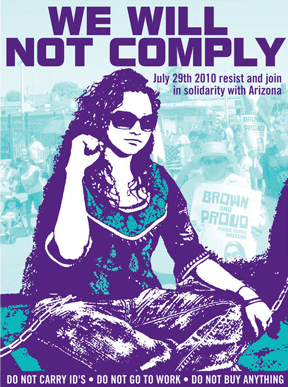 Arizona is expected to begin enforcement of SB1070 on July 29th unless President Obama succeeds in suing the state to prevent the law from being implemented. While the Justice Department is acting on the grounds that Arizona’s appropriation of immigration authority from the federal government violates the supremacy clause, groups around the country say local immigration enforcement endangers the health and safety of Arizona families.
Arizona is expected to begin enforcement of SB1070 on July 29th unless President Obama succeeds in suing the state to prevent the law from being implemented. While the Justice Department is acting on the grounds that Arizona’s appropriation of immigration authority from the federal government violates the supremacy clause, groups around the country say local immigration enforcement endangers the health and safety of Arizona families.
Enforcement of SB1070 practically requires racial profiling and discrimination, leaving people of color vulnerable to harassment and abuse at the hands of police and racist individuals emboldened by the legislation. We predict that if SB1070 is allowed and similar laws follow, many survivors of crimes like human trafficking, worker exploitation, domestic violence, and sexual assault won’t be able to tolerate the risk of coming forward to seek help.
Control of identity documents and immigration-based threats are commonly reported in investigations of human trafficking. Over the last 10 years, clients of the Break the Chain Campaign at IPS (BTCC), have reported threats like “if you run away, you will be deported,” or “the police hate immigrants, they will go after you,” or simply “you are illegal here, so you do not have rights.” When these threats are reinforced through well-publicized laws like SB1070 and the federal 287(g) program, they become irrefutable fact.
Even before SB1070, victims’ advocates and social workers have been struggling with law enforcement protocol that takes a punitive approach to dealing with undocumented victims. Countless survivors of heinous crimes have been arrested, detained, and questioned before receiving trauma counseling and emergency services, and unknown numbers have already been deported. While much progress has been made in training law enforcement to better identify and protect potential victims, an overall lack of training is one of the biggest problems for most social service advocates in the field. How will SB1070, which forces police to act (though at least one officer has already come forward to resist), affect this progress?
Rep. Raul Grijalva of Arizona, an outspoken critic of SB1070, held an ad-hoc hearing in June. There, 10-year-old Katherine tearfully recalled the experience of being separated from her family:
It was very hard for me every time I went to school. I kept thinking that maybe I would see my parents when I got back home. I would also have bad dreams where the deputies would take my aunt, her family, and me to jail. I’m still afraid of the deputies. We went to the hospital to visit a relative and I saw deputies and I did not want to go in.
The hearing was spearheaded by a coalition that included BTCC, the National Domestic Workers Alliance, The National Day Labor Organizing Network (NDLON), Legal Momentum, Jobs with Justice, the 9to5 National Association of Working Women, and the AFL-CIO.
On July 15th, these groups and others convened a follow-up “National Women and Children’s Advocacy Day.” At this hearing, Dr. Carola Suárez-Orozco, representing the American Psychological Association, referenced an Urban Institute report on the detrimental effects of immigration enforcement:
The report indicates that the vast majority of children whose parents were detained in ICE raids in the workplace and in the home exhibited multiple behavioral changes in the aftermath of parental detention, including anxiety, frequent crying, changes in eating and sleeping patterns, withdrawal, and anger. Such behavioral changes were documented both two to three months after the arrest, as well as at a nine-month follow-up. Disturbingly, the children also experienced dramatic increases in housing instability and food insecurity, which are both dimensions of basic well-being.
Rep. Lynn Woolsey (D-CA), who also attended the July hearing, introduced the HELP Separated Children Act, which ensures “parental rights of immigrant women are protected and the risk of family separation is reduced during immigrant enforcement.” The coalition joined dozens of women’s groups in urging Congress to support this act.
Now we’re organizing around the country to plan actions before July 29 against SB1070. Join us!
Or call your representatives. Ask them to consider the impact of immigration enforcement on children like Katherine, and support the HELP Separated Children Act.